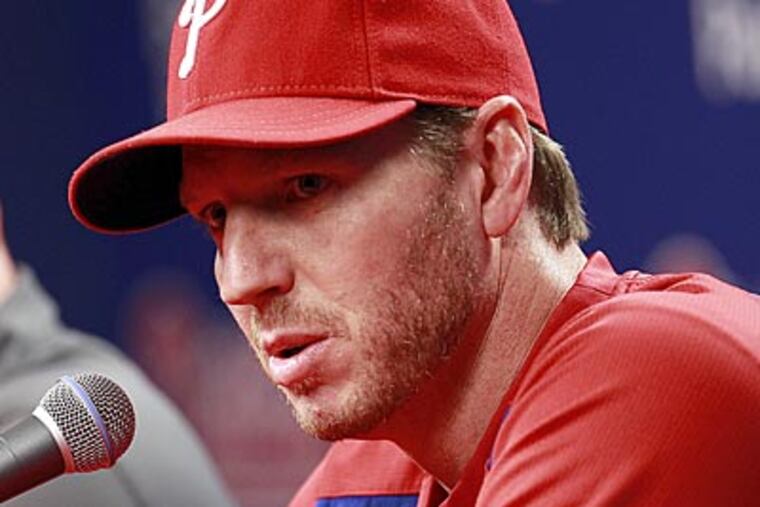Halladay confident he'll recover, finish career with Phillies
THE WORDS that the entire Phillies organization needs to internalize were spoken around 4:15 yesterday afternoon by a 35-year-old future Hall of Famer whose window for winning his profession's ultimate prize is now little more than ajar. "Ultimately, my goal is to finish my career with the Phillies and win a World Series here," Roy Halladay said in a voice that carried its usual mixture of measure and force. "Some of those things are not fully in my control, but my intent is to play here and finish my career here and be here as long as I can. I don't know what's going to happen over the next year and a half, but I know from my side I'm going to make an effort to be here as long as I can and finish here. I don't want to go anywhere else."

The words that the entire Phillies organization needs to internalize were spoken around 4:15 yesterday afternoon by a 35-year-old future Hall of Famer whose window for winning his profession's ultimate prize is now little more than ajar.
"Ultimately, my goal is to finish my career with the Phillies and win a World Series here," Roy Halladay said in a voice that carried its usual mixture of measure and force. "Some of those things are not fully in my control, but my intent is to play here and finish my career here and be here as long as I can. I don't know what's going to happen over the next year and a half, but I know from my side I'm going to make an effort to be here as long as I can and finish here. I don't want to go anywhere else."
The context for those remarks is the current juncture at which the Phillies find themselves: aging and injured, two games under .500, six games out of first place, the potential free agency of two of their stars drawing nearer as the glory nights of 2008 fade further into the rearview mirror. Six hours after Halladay took the podium to address the strained back muscle that is expected to sideline him for 6-to-8 weeks, the ugly turned uglier. In a 6-5 defeat at the hands of the Dodgers, the Phillies lost their fifth straight game and their interim second baseman, Freddy Galvis, the former by way of a blown 4-2 lead, the latter by way of a back injury suffered during a fifth-inning at-bat.
All of the signs of decline are there, from the absences of the injured stars to the substandard production of the healthy ones.
"Everything about our team is kind of whacked up," a frustrated Charlie Manuel said after the latest defeat.
Yet there sat Halladay, well into a chapter that many other stars have spent hopping from franchise to franchise in search of a title, reaffirming his desire to bring a World Series trophy to Philadelphia and Philadelphia alone. He has already sacrificed plenty for the benefit of the Phillies, starting with the cut-rate 3-year, $60 million contract extension he signed in order to facilitate the deal that landed him. In 2010 and 2011, he averaged 32 starts and 242 innings, pitching through a groin injury in one postseason and then throwing 126 pitches over eight innings while trying desperately to extend the next one.
Now, the Phillies must find a way to win without him. His absence will coincide with, and perhaps conflate, one of the most pivotal time periods in the recent history of this franchise. They are in last place in the division, 3.5 games behind their closest competitor. They have yet to solidify the future of their brightest young star. Their star first baseman and second baseman have yet to play in a competitive game, a fact Manuel pointed out to a questioner who wondered if the potential returns of Ryan Howard and Chase Utley were cause for hope.
The decisions and improvements that need to be made between now and the July 31 trade deadline are significant. But so is this: Halladay believes.
He believes that 3 weeks of rest and 3-to-5 weeks of throwing will return his body to its baseline state. He believes that he will return to the form that has enabled him guide the Phillies through the oft-turbulent waters of the last 2-plus years. He believes that any questions about his contract are irrelevant. Because Halladay believes that he will return to a team that is capable of winning the World Series in 2012, and an organization that has laid the groundwork for contention in the years that follow.
"I'm going to be optimistic that we're still right there," he said. "I feel like even if we do have a little bit of ground to make up, I feel like we have a lot of guys that are coming back and that we have guys who can overcome that . . . The last couple months are going to be important. Ultimately I think that's a lot of the important of how we handle this — I want to feel like I can contribute when we need it, and I want to be healthy for that."
It was a declaration of faith, but the Phillies need to view it as a challenge. Over the next 6-to-8 weeks, Halladay will be doing everything in his power to put himself back in position to win that elusive crown. Despite the circumstances, the rest of the organization must do the same.